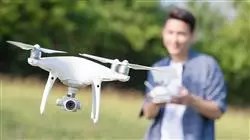University certificate
The world's largest faculty of engineering”
Introduction to the Program
If you are looking for quality training that will help you specialize in one of the fields with the most professional prospects, this is your best option”

The emergence of drones has changed the world of aeronautics. Drone technology is advancing at great speed, evolving much faster even than mobile technology. This technology has advanced so much that, nowadays, there are drones with more than 20 hours of flight autonomy.
Moreover, the advance of drones implies a growing need for pilots to specialize in their use. Flying a drone for entertainment purposes is not the same as flying a high value drone for specialized operations. That is why this intensive training is so vital, as it will provide professionals with the specialization that they need.
This program is aimed at those interested in attaining a higher level of knowledge of Drones. The main objective of this Postgraduate diploma is for students to specialize their knowledge in simulated work environments and conditions in a rigorous and realistic manner so that they can later apply it in the real world.
Additionally, as it is a 100% online Postgraduate diploma, students are not constrained by fixed timetables or the need to commute to another physical location, rather, can access the contents at any time of the day, balancing their professional or personal life with their studies.
Do not miss the opportunity to study this Postgraduate diploma in Drones at TECH. It's the perfect opportunity to advance your career”
With this Postgraduate diploma in Drones, students will be trained in the latest trends in the field related to maximum Energy Saving and Sustainability and will obtain an extensive body of knowledge of different applications and requirements at an international level:
- Practical cases presented by experts in Drones
- The graphic, schematic, and eminently practical contents with which they are created, provide scientific and practical information on the disciplines that are essential for professional practice
- Practical exercises where self assessment can be used to improve learning
- A special emphasis on innovative methodologies in Drones
- Theoretical lessons, questions to the expert, debate forums on controversial topics, and individual reflection assignments
- Content that is accessible from any fixed or portable device with an Internet connection
This Postgraduate diploma is the best investment you can make when choosing a refresher program to update your existing knowledge of Drones”
The teaching staff includes professionals in the field of Drones, who bring their experience to this specialization program, as well as renowned specialists from leading societies and prestigious universities.
The multimedia content, developed with the latest educational technology, will provide the professional with situated and contextual learning, i.e., a simulated environment that will provide immersive training programmed to train in real situations.
This program is designed around Problem Based Learning, whereby the professional must try to solve the different professional practice situations that arise during the academic year. For this, the professional will have the help of an innovative, interactive video system made by recognized and experienced experts in Drones.
This program comes with the best educational material, providing you with a contextual approach that will facilitate your learning”

This 100% online Postgraduate diploma will allow you to balance your professional life with your studies. You choose where and when to train”
Why study at TECH?
TECH is the world’s largest online university. With an impressive catalog of more than 14,000 university programs available in 11 languages, it is positioned as a leader in employability, with a 99% job placement rate. In addition, it relies on an enormous faculty of more than 6,000 professors of the highest international renown.

Study at the world's largest online university and guarantee your professional success. The future starts at TECH”
The world’s best online university according to FORBES
The prestigious Forbes magazine, specialized in business and finance, has highlighted TECH as “the world's best online university” This is what they have recently stated in an article in their digital edition in which they echo the success story of this institution, “thanks to the academic offer it provides, the selection of its teaching staff, and an innovative learning method aimed at educating the professionals of the future”
A revolutionary study method, a cutting-edge faculty and a practical focus: the key to TECH's success.
The most complete study plans on the university scene
TECH offers the most complete study plans on the university scene, with syllabuses that cover fundamental concepts and, at the same time, the main scientific advances in their specific scientific areas. In addition, these programs are continuously being updated to guarantee students the academic vanguard and the most in-demand professional skills. In this way, the university's qualifications provide its graduates with a significant advantage to propel their careers to success.
TECH offers the most comprehensive and intensive study plans on the current university scene.
A world-class teaching staff
TECH's teaching staff is made up of more than 6,000 professors with the highest international recognition. Professors, researchers and top executives of multinational companies, including Isaiah Covington, performance coach of the Boston Celtics; Magda Romanska, principal investigator at Harvard MetaLAB; Ignacio Wistumba, chairman of the department of translational molecular pathology at MD Anderson Cancer Center; and D.W. Pine, creative director of TIME magazine, among others.
Internationally renowned experts, specialized in different branches of Health, Technology, Communication and Business, form part of the TECH faculty.
A unique learning method
TECH is the first university to use Relearning in all its programs. It is the best online learning methodology, accredited with international teaching quality certifications, provided by prestigious educational agencies. In addition, this disruptive educational model is complemented with the “Case Method”, thereby setting up a unique online teaching strategy. Innovative teaching resources are also implemented, including detailed videos, infographics and interactive summaries.
TECH combines Relearning and the Case Method in all its university programs to guarantee excellent theoretical and practical learning, studying whenever and wherever you want.
The world's largest online university
TECH is the world’s largest online university. We are the largest educational institution, with the best and widest online educational catalog, one hundred percent online and covering the vast majority of areas of knowledge. We offer a large selection of our own degrees and accredited online undergraduate and postgraduate degrees. In total, more than 14,000 university degrees, in eleven different languages, make us the largest educational largest in the world.
TECH has the world's most extensive catalog of academic and official programs, available in more than 11 languages.
Google Premier Partner
The American technology giant has awarded TECH the Google Google Premier Partner badge. This award, which is only available to 3% of the world's companies, highlights the efficient, flexible and tailored experience that this university provides to students. The recognition as a Google Premier Partner not only accredits the maximum rigor, performance and investment in TECH's digital infrastructures, but also places this university as one of the world's leading technology companies.
Google has positioned TECH in the top 3% of the world's most important technology companies by awarding it its Google Premier Partner badge.
The official online university of the NBA
TECH is the official online university of the NBA. Thanks to our agreement with the biggest league in basketball, we offer our students exclusive university programs, as well as a wide variety of educational resources focused on the business of the league and other areas of the sports industry. Each program is made up of a uniquely designed syllabus and features exceptional guest hosts: professionals with a distinguished sports background who will offer their expertise on the most relevant topics.
TECH has been selected by the NBA, the world's top basketball league, as its official online university.
The top-rated university by its students
Students have positioned TECH as the world's top-rated university on the main review websites, with a highest rating of 4.9 out of 5, obtained from more than 1,000 reviews. These results consolidate TECH as the benchmark university institution at an international level, reflecting the excellence and positive impact of its educational model.” reflecting the excellence and positive impact of its educational model.”
TECH is the world’s top-rated university by its students.
Leaders in employability
TECH has managed to become the leading university in employability. 99% of its students obtain jobs in the academic field they have studied, within one year of completing any of the university's programs. A similar number achieve immediate career enhancement. All this thanks to a study methodology that bases its effectiveness on the acquisition of practical skills, which are absolutely necessary for professional development.
99% of TECH graduates find a job within a year of completing their studies.
Postgraduate Diploma in Drones
.
Have you ever dreamed of becoming a drone expert and dominate the sky with your own hands? Get ready to live a unique and exciting experience with the virtual Postgraduate Diploma in Drones offered by the prestigious Faculty of Engineering of TECH Global University! Imagine acquiring advanced skills in drone handling, learning the most innovative flight techniques and exploring the endless possibilities that this fascinating world offers. Do you want to become a highly trained professional and stand out in the labor market? This Postgraduate Diploma gives you the opportunity to achieve it. Our teaching team is made up of experts in the drone industry, who will share their experience and technical knowledge with you. You'll learn from the best, honing your skills in areas such as flight planning, data capture and analysis, equipment maintenance and much more.
Don't miss the opportunity to learn from the best.
Don't miss this unique opportunity to become a drone expert!
In this course, you will be immersed in a complete and updated syllabus, ranging from theoretical fundamentals to the latest trends in the use of drones in different sectors. You will discover applications in agriculture, engineering, infrastructure inspection, aerial filming and many other growing areas. Studying at TECH is an incredible opportunity. Our university stands out for its academic excellence, state-of-the-art infrastructure and commitment to the specialization of highly competent professionals. We will provide you with all the support you need to make the most of your learning experience. Upon completion of this Postgraduate Diploma, you will be prepared to work in an ever-expanding market and demand for drone specialists. You will be able to collaborate with companies in various sectors, providing innovative solutions and taking technology to new limits. Discover all that TECH has to offer and embark on your journey into a future full of fascinating possibilities. Enroll now and reach new heights with TECH Global University's Postgraduate Diploma in Drones!







